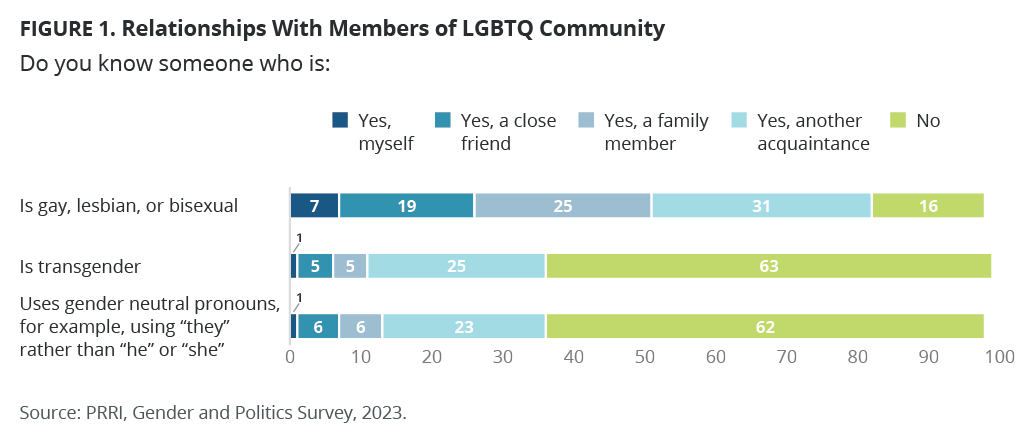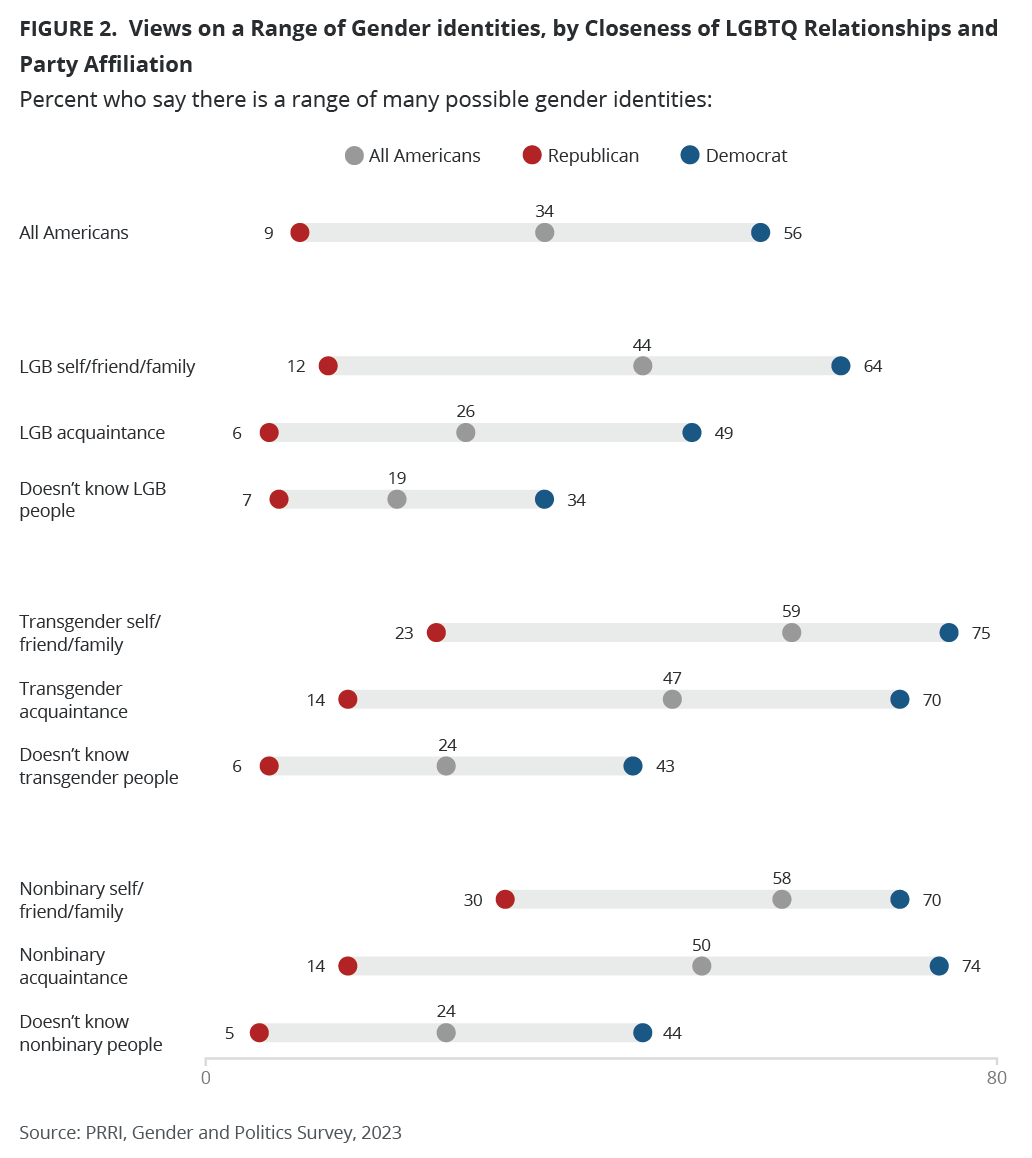Today, more and more Americans, especially young people, are identifying as members of the LGBTQ community. While members of the LGBTQ community have been subjects of prejudice and discrimination, it has consistently been shown that intergroup contact with individuals who identify as LGBTQ is associated with more positive feelings toward the LGBTQ community. This Spotlight looks more closely at the impact knowing a member of the LGBTQ community has on Americans’ views on gender.
How Many Americans Know Someone Who Is LGBTQ?
PRRI’s recent Gender and Politics survey finds that most Americans know someone who is gay, lesbian, or bisexual, however, significantly fewer know someone who is transgender or uses gender neutral pronouns. Half of Americans (51%) say they have a close personal relationship with someone who is gay, lesbian, or bisexual, including 7% who say they themselves are gay, lesbian, or bisexual, 19% who say a close friend is, and 25% who say a family member is gay, lesbian, or bisexual. An additional 31% say they know an acquaintance is gay, lesbian, or bisexual. Around two in ten Americans (16%) say they do not know anyone who is gay, lesbian, or bisexual.
Americans are much less likely to report having a close personal relationship with someone who is transgender or who uses gender neutral pronouns.[1] Around one in ten Americans (11%) say they know someone who is transgender, including 1% who say they are trans, 5% who say a close friend is, and 5% who say a family member is. Thirteen percent of Americans say they know someone who uses gender neutral pronouns, including 1% who say they use them, 6% who say a close friend does, and 6% who say a family member does. Another quarter of Americans (25%) say they know an acquaintance who is transgender (25%) or nonbinary (23%). Six in ten Americans (63%) do not know someone who is transgender (63%) or who uses gender neutral pronouns (62%).

Unsurprisingly, LGBTQ Americans and those with close friends or family members who are LGBTQ are more likely to support LGBTQ rights and be open to the idea that there is a range of gender identities than those with a more distant LGBTQ acquaintance or no LGBTQ acquaintances.
Americans’ Opinions on Gender
About two-thirds of Americans (65%) think there are only two gender identities, man and woman, and half of Americans feeling strongly that there are only two genders (50%). On the other hand, one-third of Americans think there is a range of gender identities (34%), with 14% who feel strongly about it.
In general, Americans who have a close personal relationship with a member of the LGBTQ community are more likely to agree that there are a range of many gender identities than those who only have an acquaintance or don’t know anyone who is LGBTQ.[2] However, when it comes to attitudes on gender identity, differences can be seen between different members of the LGBTQ community and their family/close friends. This Spotlight finds that those who identify specifically as gay, lesbian, or bisexual and their close friends and family are less likely to think there is a range of gender identities (44%) than Americans who are transgender or nonbinary and their close friends and family members (59%).[3]
Looking at partisanship, Democrats are six times more likely than Republicans to believe there is a range of gender identities (56% vs. 9%). However, having a close relationship to a member of the LGBTQ community makes a difference, particularly among Republicans. Republicans who themselves identify or know someone who is LGB (12%), transgender (23%) or nonbinary (30%) are significantly more likely to say there are a range of gender identities than Republicans who know an acquaintance who is LGB (6%), transgender or nonbinary (both 14%) or Republicans who don’t know anyone who is LGB (7%), transgender (6%), or nonbinary (5%). By contrast, at least half of Democrats with close and weak relationships with members of the LGBTQ community agree that there are a range of gender identities, compared with around four in ten or less Democrats who don’t know anyone who is LGBTQ. [4]

This Spotlight Analysis is part of a series on Americans’ proximity to the LGBTQ community. Read more:
[1] In this Spotlight, those who “use gender neutral pronouns” and “nonbinary” are used interchangeably.
[2] “Close personal relationship” includes having a close friend or a family member who is LGBTQ or being LGBTQ themselves
[3] Gender identity and sexual orientation are not the same. While sexual orientation refers to the emotional, romantic, and/or sexual attraction to other people, gender identity refers to “a person’s deeply felt, internal and individual experience of gender, which may or may not correspond to the person’s physiology or designated sext at birth.”
[4] “Close personal relationship” includes having a close friend or a family member who is LGBTQ or being LGBTQ themselves. “Weak relationships” refer to those who have acquaintances who are members of the LGBTQ community.